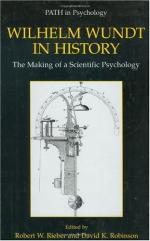|
This section contains 1,796 words (approx. 6 pages at 300 words per page) |

|
Wilhelm Wundt, the German philosopher and psychologist who founded the first psychological laboratory and won world fame as a teacher and scholar, was born in Neckarau, a suburb of Mannheim. After studying medicine at the universities of Tübingen, Heidelberg, and Berlin, he was a Privatdozent from 1857 to 1864 at the Physiological Institute founded by Hermann von Helmholtz in Heidelberg. At the age of twenty-four he became so severely ill that he was given up by his physicians and remained close to death for several weeks. In this time of crisis he developed his most essential religious and philosophical views, and also his ideas concerning the mental.
In a series of contributions to the theory of sense perception, published between 1858 and 1862, Wundt's interest in psychological problems, an interest derived from his physiological studies, becomes clear. He gave his first psychological lecture in 1862, and in 1863 his...
|
This section contains 1,796 words (approx. 6 pages at 300 words per page) |

|


